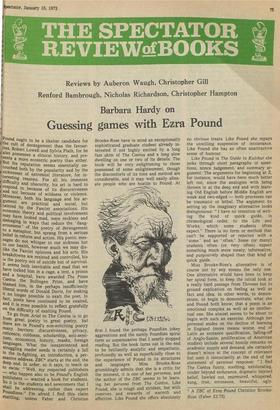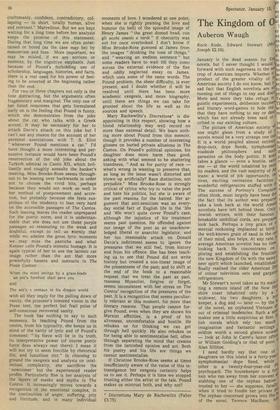Barbara Hardy on
Guessing games with Ezra Pound
!Pound ought to be a likelier candidate for to the cult of derangement than the favourites, Robert Lowell and Sylvia Plath, for he also possesses a clinical history, and presents a more eccentric poetry than either. ti But his reputation seems essentially untouched both by the popularity and by the 10 sicknesses of extremist literature, for inI teresting reasons. For all his immense 0 difficulty and obscurity, his art is hard to respond to because of its discursiveness 0 and not because of wildness or violence. 0 Moreover, both his language and his argument are practical and social, but tainted by the Fascist associations. His economic theory and political involvement may have looked mad, were reckless and damaging in ways that reduce the 'dangerousness ' of the poetry of derangement to a metaphor, but sprang from a serious belief in reform and action. His poetic messages do not whisper to our sickness but to our health, however much we may dislike the Fascist opinions and his acts. His breakdowns are resisted and controlled, his is the poetry not of suicide but of survival. It seems both inevitable and mad that we have locked him in a cage, a tent, a prison and a hospital, have awarded The Pisan Cantos the Bollingen Prize, and have blamed him, in the perhaps insufficiently liberal words of Donald Davie, for making it no longer possible to exalt the poet. In fact, Poets have continued to be exalted, and it is even possible to reflect gratefully on the difficulty of exalting Pound.
To go from Ariel to The Cantos is to go from great poetry to great poetry, but there are in Pound's non-soliciting poetry many barriers: discursiveness, privacy, reticence, coldness, scholarship, anti-semitism, economics, history, masks, foreign languages. What the inexperienced and struggling reader needs is certainly a lull in the in-fighting, an introduction, a persuasive address. ZBC* starts at the end, the deep end. In order, so it says, to teach us to swim: "Well, my respected publishers — who happen also to be Pound's English Publishers — wanted a book for students. So it is the students aril newcomers that I Shall be addressing, rather than expert Poundians." I'm afraid I find this claim startling, unless Faber and Christine
Brooke-Rose have in mind an exceptionally sophisticated graduate student already interested if not highly excited by a long fast skim of The Cantos and a long slow dwelling on one or two of its details. The book will be very enlightening to those possessed of some enlightenment, though the discomforts of its tone and method are considerable, and it may well easily alienate people who are hostile to Pound. At first I found the perhaps Poundian jokey aggressions and the surely Poundian spiral form so unpersuasive that I nearly stopped reading. But the book turns out in the end to be brilliantly analytic and empathetic, profoundly as well as superficially close to the experience of Pound in its structures and languages. Miss Brooke-Rose grumblingly admits that she is a critic for the moment, it is one of her personae, and the author of the ZBC seems to be learning her persona from The Cantos. Like Pound, she is rough and strident, but with reserves and rewards of warmth and affection. Like Pound she offers absolutely no obvious treats. Like Pound she repays the unwilling suspension of intolerance. Like Pound she has an often unattractive sense of humour.
Like Pound in The Guide to Kulchur she jerks through short paragraphs of assertions, nonce judgement, and summary argument. The arguments for beginning at Z, for instance, would have been much better left out, since the analogies with being thrown in at the deep end and with learning Old English before Middle English are weak and two-edged — both processes can be traumatic or lethal, The argument by setting up the imaginary alternative looks disingenuous: "I have no intention of writing the kind of quick guide, in chronological order, to the Life and Works, which some students often expect." There is no form or method that can't be supported or rejected with a ' some ' and an 'often.' Some (or many) students often (or very often) expect something much more meaty, informative, and purposively shaped than that kind of quick guide.
Miss Brooke-Rose's alternative is of course not by any means the only one. One alternative would have been to keep her spiral form, to keep the initial look at a really hard passage from Thrones but to ground explication on feeling as well as fact and idea. In other words, to demonstrate, or begin to demonstrate, what she and Pound both know, that a poem is an emotional complex as well as an intellectual one. She almost seems to be about to begin with such an exercise. Although her personal asides on the decline of learning in England (more means worse, end of Latin as entrance qualification, falling-off of Anglo-Saxon, proliferation of American studies) include several hostile remarks on academic supply and demand, she certainly doesn't wince at the concept of relevance but uses it insouciantly at the end of her statement of personal response: "I find The Cantos funny, soothing, exhilarating, tender beyond endurance, dogmatic beyond belief, bawled out, murmured, whispered, sung, true, erroneous, beautiful, ugly, craftsmanly, confident, contradictory, collapsing — in short, totally human, alive and relevant." Marvellous. But we are kept waiting for a long time before her analysis keeps the promise of this statement.
During that long time we are often enter tained or bored (as the case may be) by mannerism and fuss. More important, we may be misled, if we are novices or enemies, by the cognitive emphasis. Just because of Pound's forbidding use of scholarship, languages, histories, and facts, there is a real need for his power of feeling to be asserted at the beginning rather than the end.
For two or three chapters not only is the tone distracting, but the arguments often fragmentary and marginal. The only one of her listed responses that gets formulated early on is the feeling that Pound is funny, which she demonstrates from the joke about the cat who talks with a Greek accent. It may be necessary for her to attack Davie's attack on this joke but I can't see any reason for the account of her personal associations with T. S. Eliot " whenever Pound mentions a cat." I'd have thought a more interesting and persuasive instance would have been Pound's resurrection of the old joke about the Turkish admiral in Canto XII, which brilliantly and roughly assaults the banker's meeting. Miss Brooke-Rose seems throughout to be leaning over backwards in order not to choose the vivid bits, perhaps because they would not work so well in her method of postponement and accretion, but probably because she feels suspicious of the tendency to lean very hard on the accessible passages of The Cantos. Such leaning leaves the reader unprepared for the poetic norm, and it is understandable that she does not use those purple passages so reassuring to the weak and doubtful, except to tell us sternly that while we admire the great lyric moments we may miss the pastiche and what Kenner calls Pound's mimetic homage. It is again typical of her to use the laconic cat image rather than the ant that more powerfully haunts and instructs in The Pisan Cantos:
When the mind swings by a grass-blade an ant's forefoot shall save you
and
The ant's a centaur in his dragon world
with all they imply for the pulling down of vanity, the prisoner's lowered vision in the Pisan tent, the perfect but frail poise of self-conscious recovered sanity.
The book has nothing to say to such moments. In teaching Pound from the centre, from his typicality, she keeps us in mind of the rarity of lyric and of Pound's comment: " its force will lie in its truth, its interpretative power (of course poetic force does always rest there): I mean it will not try to seem forcible by rhetorical din, and luxurious riot." In choosing to ground the exegesis and analysis on intellectual complexity, she sacrifices the ' newcomer ' but the experienced reader profits. Particularly fine is her analysis of the layers of masks and myths in The Cantos. It increasingly moves towards a recognition of the emotional complex, in the continuities of anger, suffering, pity and fortitude, and in many individual moments of love. I wondered at one point, when she is rightly praising the love and humour (in hell) of the splendid image of Henry James "the great domed head, con gli occhi onesti e tardi" if obscurity was not for once overlooked. I don't know if Miss Brooke-Rose guessed at James from the images "drinking the tone of things," and "weaving an endless sentence" but some readers have to wait till they come across the external evidence of the fine and oddly neglected essay on James, which uses some of the same words. The Pound problem, the sheer difficulty, is ever present, and I doubt whether it will be resolved until there has been more academic exegesis, and more biography, until there are things we can take for granted about the life as well as the sources and speech.
Mary Rachewiltz's Discretions* is disappointing in this respect, showing how a blood relationship may well record no more than external detail. We learn nothing more about Pound from this memoir, though it provides a number of interesting glosses on buried private allusions in The Cantos. On Pound's political opinions, his daughter does more harm than good, asking with what seemed to be shattering blandness, "And as for purity of race — what's wrong in wanting to preserve that, as long as the issue wasn't distorted and blown up artificially? Race distinction, not prejudice," Miss Brooke-Rose is strongly critical of critics who try to value the poet and hate his politics, but she is aware of the past reasons for the hatred. Her argument that anti-semitism was an everyday social fact of English life in the '30s and '40s won't quite cover Pound's case, although the injustice of his treatment seems past question. He offended against our image of the poet as an unacknowledged liberal or anarchic legislator, and her too reasonable attack on Donald Davie's indictment seems to ignore the pressures that we still feel, from history and from his offence. She has been teaching us to see that Pound did not write history but created a non-linear image of the presentness of the past; and to shift at the end of the book to a reasonable request that we treat the past as past, reassess Mussolini, forgive or forget, seems inconsistent with her stress on The Cantos' recognition of the pressures of the past. It is a recognition that seems peculiarly relevant at this moment, for more than literary reasons. That people cannot forgive Pound, even when they are shown his Marxist affinities, is a proof of his aliveness, uncomfortable and hostile. He rebukes us for thinking we can get through hell quickly. He also rebukes us for being able to sentimentalise hell, often through separating the mind that creates from the tarnished opinion and act. Both his poetry and his life are things we cannot sentimentalise.
If Christine Brooke-Rose seems at times insufficiently aware of the value of this in transigence her exegesis certainly helps us to see it. Perhaps it is time we stopped trusting either the artist or the tale. Pound makes us mistrust both, and why not?
Discretions Mary de Rachewiltz (Faber £3.75)











































 Previous page
Previous page